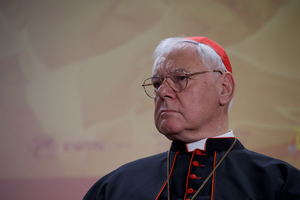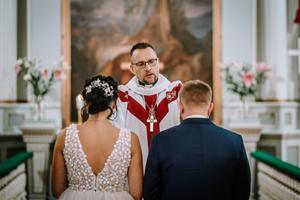Benedict XVI Breaks His Silence on the Catholic Church’s Sex-Abuse Crisis
In a German-language essay published Thursday, the pope emeritus provides a way forward.

VATICAN CITY — In his most significant pronouncement since he resigned the papacy in 2013, Pope Emeritus Benedict XVI has written a lengthy essay on clerical sex abuse in which he explains what he sees as the roots of the crisis, the effects it has had on the priesthood, and how the Church should best respond.
Running at just over 6,000 words and to be published April 11 in Klerusblatt, a small-circulation Bavarian monthly, Benedict XVI places the blame mainly on the sexual revolution and a collapse of Catholic moral theology since the Second Vatican Council. This resulted, he argues, in a “breakdown” in the seminary formation that had preceded the Council.
Benedict criticizes canon law for initially being insufficient in dealing with the scourge, explains the reforms he introduced to deal with abuse cases, and asserts that “only obedience and love for our Lord Jesus Christ” can lead the Church out of the crisis.
The pope emeritus begins his essay, entitled “The Church and the Scandal of Sexual Abuse,” by noting that the “extent and gravity” of the abuse crisis has “deeply distressed” priests and laity and “driven more than a few to call into question the very faith of the Church.”
Recalling the Vatican’s Feb. 21-24 summit on the protection of minors in the Church, he says it was “necessary” to send out a “strong message” and seek a “new beginning” so the Church could again become “truly credible.”
Benedict writes that he compiled notes from the documents and reports from that meeting that culminated in this text, which he says he has shown to Pope Francis and Cardinal Pietro Parolin, the Vatican secretary of state.
The essay is divided into three parts. The first is an examination of the “wider societal context” of the crisis, in which he says he tries to show that an “egregious event” occurred in the 1960s “on a scale unprecedented in history.”
A second section deals with the effects of this on the “formation of priests and on the lives of priests.”
And in a third part he develops “some perspectives for a proper response on the part of the Church.”
‘1968 Revolution’
To give an idea of the wider societal context, the Pope Emeritus recalls the “all-out sexual freedom” that followed the “1968 Revolution.” From 1960 to 1980, he says “standards regarding sexuality collapsed entirely,” resulting in a “normlessness” that, despite “laborious attempts,” has not been halted.
Drawing primarily on examples from German-speaking Europe, he remembers state-sponsored graphic sex education, lascivious advertising and “sex and pornographic movies” that became a “common occurrence” after 1968. This, in turn, led to violence and aggression, he says, and pedophilia was “diagnosed as allowed and appropriate.”
He wondered at the time how young people would approach the priesthood in this environment and says the collapse in vocations and “very high number of laicizations” were a “consequence of all these processes.”
At the same time, Catholic moral theology also “suffered a collapse,” he says, rendering the Church “defenseless against these changes in society.”
He explains that, until the Second Vatican Council, moral theology was largely founded on natural law, but in the “struggle for a new understanding of Revelation,” the “natural law was largely abandoned, and a moral theology based entirely on the Bible was demanded.”
In consequence, Benedict says, no longer could anything be “constituted an absolute good,” but only the “relative” could be “better, contingent on the moment and on circumstances.”
This relativistic perspective reached “dramatic proportions” in the late 1980s and 1990s, when documents emerged such as the 1989 “Cologne Declaration,” which dissented from Pope St. John Paul II’s teaching, prompting an “outcry against the Magisterium of the Church.” He recalls how John Paul II tried to stem the crisis in moral theology through his 1993 encyclical Veritatis Splendor and creating the Catechism.
But dissenting theologians started applying infallibility only to matters of faith and not to morals, even though, Benedict writes, the Church’s moral teaching is deeply linked to the faith. Those who deny this, he continues, force the Church to remain silent “precisely where the boundary between truth and lies is at stake.”
Formation Breakdown
Turning to the second part of his essay, Benedict says this “long-prepared and ongoing process of dissolution of the Christian concept of morality” led to a “far-reaching breakdown” in priestly formation.
He notes how “various seminary homosexual cliques” had a significant impact on seminaries, resulting, in the U.S. at least, in two apostolic visitations that bore little fruit.
But he also underlines how changes to the appointment of bishops after Vatican II put an emphasis on “conciliarity,” leading to a “negative attitude” toward tradition — so much so that Benedict says even his own books were “hidden away, like bad literature, and only read under the desk.”
Pedophilia did not become “acute” until the late 1980s, he says, but canon law at that time “did not seem sufficient” for dealing with the crime. Rome believed “temporary suspension” was sufficient to “bring about purification and clarification,” but this was not accepted by U.S. bishops dealing with the emerging American clergy abuse crisis, because the alleged abusers were still “directly associated” with their bishop. A “renewal and deepening” of the “deliberately loosely constructed criminal law” of the 1983 Code of Canon Law then “slowly” began to take place.
Benedict also pinpointed another canonical problem: the Church’s perception of criminal law which so fully guaranteed the accused’s rights that “any conviction” was “factually excluded” — something he describes as “guarantorism.”
But Benedict argues that a “properly formed canon law” must contain a “double guarantee” — legal protections for both the accused and the “good at stake,” which he defines as protecting the deposit of faith. The faith “no longer appears” to be a good “requiring protection,” he says, adding it is an “alarming situation” that pastors must take “seriously.”
To help overcome this “guarantorism,” Benedict decided with John Paul II to transfer abuse cases from the Congregation for Clergy to the Congregation for the Doctrine of the Faith (CDF) — a move, he says, that was crucially important to the Church, as such misconduct “ultimately damages the faith” and that enabled “the maximum penalty” to be imposed.
But he adds that an aspect of guarantorism rightly remained in force, namely the need for “clear proof of the offense.” To ensure this, and that penalties were lawfully imposed, Benedict says the Holy See would take over investigation of cases if dioceses were “overwhelmed” by the need for a “genuine criminal process.” The possibility for appeal was also provided.
But all of that was “beyond the capacities” of the CDF at the time, leading to delays. “Pope Francis has undertaken further reforms,” Benedict notes.
What Must Be Done
Turning to what needs to be done, Benedict argues that trying to “create another Church” has “already failed” and proceeds to give a catechesis on how the “power of evil arises from our refusal to love God.”
He teaches that a world without God “can only be a world without meaning,” without standards of “good or evil,” where “power is the only principle” and “truth does not count.” A society without God “means the end of freedom,” he continues, and Western society is one where “God is absent” and has “nothing left to offer it.”
“At individual points it becomes suddenly apparent that what is evil and destroys man has become a matter of course,” Benedict writes. “That is the case with pedophilia. It was theorized only a short time ago as quite legitimate, but it has spread further and further. And now we realize with shock that things are happening to our children and young people that threaten to destroy them. The fact that this could also spread in the Church and among priests ought to disturb us in particular.”
Pedophilia reached such proportions, he says, because of the “absence of God,” and he notes how Christians and priests “prefer not to talk about God” and he has “become the private affair of a minority.”
Therefore, the “paramount task” is to once again place God in the “center of our thoughts, words and actions,” he says, to be “renewed and mastered by the faith” rather than be “masters of faith.”
He says the Second Vatican Council “rightly” focused on returning the real presence of Christ to the center of Christian life, but today a “rather different attitude is prevalent,” one that destroys the “greatness of the Mystery.” This has resulted in declining participation in Sunday Mass, the devaluation of the Eucharist to a “ceremonial gesture,” and the reception of Holy Communion simply as a “matter of course.”
“What is required first and foremost is the renewal of the Faith in the Reality of Jesus Christ given to us in the Blessed Sacrament,” Benedict says. “In conversations with victims of pedophilia, I have been made acutely aware of this.”
The Indestructible Holy Church
He also observes that the Church today is “widely regarded as just some kind of political apparatus,” spoken of in “political categories” as something we must “now take into our own hands and redesign.” But a “self-made Church cannot constitute hope,” he says.
Noting that the Church today is and always has been made up of wheat and weeds, of “evil fish” and “good fish,” he says that to proclaim both “is not a false form of apologetics, but a necessary service to the Truth.”
But the devil is identified in the Book of Revelation as “the accuser who accuses our brothers before God day and night” because he “wants to prove there are no righteous people.” Today, the accusation against God is “above all about disparaging His Church as bad in its entirety and thus dissuading us from it,” he says.
But he stresses that, also today, the Church is “not just made up of bad fish and weeds,” but continues to be the “very instrument” through which God saves us.
“It is very important to oppose the lies and half-truths of the devil with the whole truth,” Benedict says. “Yes, there is sin in the Church and evil. But even today there is the Holy Church, which is indestructible.”
And he recalls the “many people who humbly believe, suffer and love, in whom the real God, the loving God, shows Himself to us,” as well as “His witnesses (martyres) in the world.”
“We just have to be vigilant to see and hear them,” he says, adding that an “inertia of the heart” leads us to “not wish to recognize them” — but recognizing them is essential to evangelization, he says.
Benedict closes by thanking Pope Francis “for everything he does to show us, again and again, the light of God, which has not disappeared, even today. Thank you, Holy Father!”
Edward Pentin is the Register’s Rome correspondent.


















